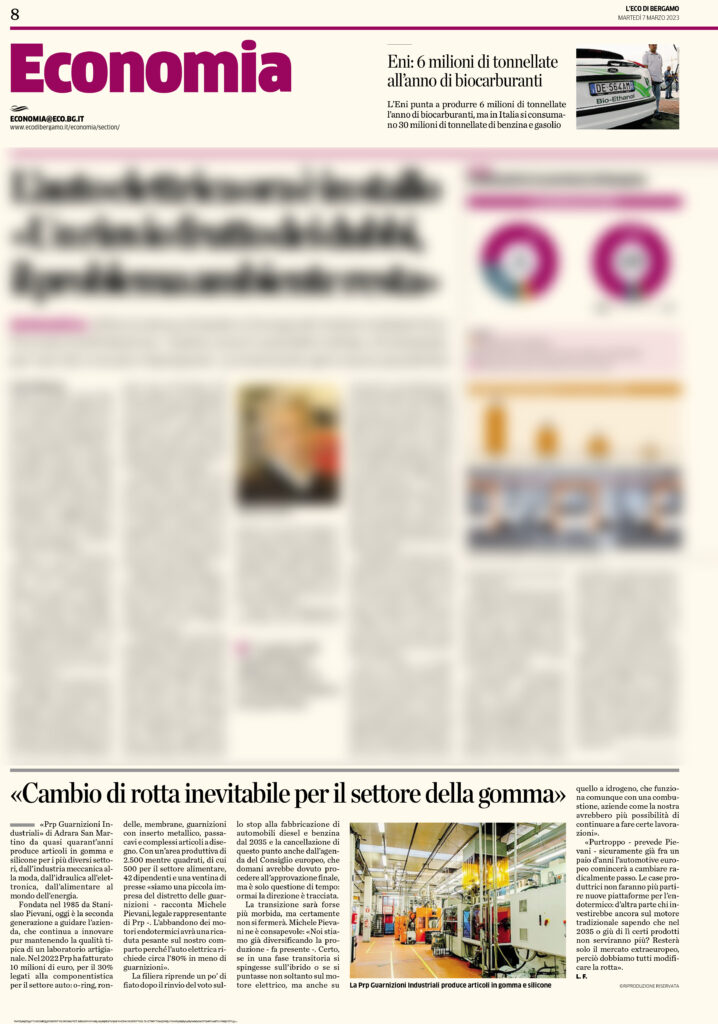2025

Vieni a trovarci:
PADIGLIONE 2 STAND 117
La fiera Zootecnica Internazionale di Cremona è uno degli eventi più rilevanti al mondo nel comportato, richiamando professionisti e azienda da tutto il mondo. P.R.P. di Pievani S. & C. S.N.C. parteciperà a tale fiera dal 27 al 29 novembre 2025 e sarà una grande occasione per presentare i nostri prodotti in un contesto specializzato. Prenderemo parte all’evento, grazie anche dal programma offerto da Regione Lombardia e cofinanziato dall’Unione Europea, per ampliare e rafforzare la nostra rete commerciale, scoprire gli ultimi aggiornamenti del settore e presentare la nostra azienda.
Vieni a trovarci:
PADIGLIONE 2
STAND 117

2024
Visit us at
– FAZI *Hall 1, Stand B42, Montichiari (BS) Italy, from 25th to 27th of October
– EUROTIER *Hall 13, Stand B57, Hannover Germany from 12th to 15th of November
17 Luglio 2023

Vieni a trovarci:
PADIGLIONE 2 STAND 117
La fiera Zootecnica Internazionale di Cremona è uno degli eventi più rilevanti al mondo nel comportato, richiamando professionisti e azienda da tutto il mondo. P.R.P. di Pievani S. & C. S.N.C. parteciperà a tale fiera dal 27 al 29 novembre 2025 e sarà una grande occasione per presentare i nostri prodotti in un contesto specializzato. Prenderemo parte all’evento, grazie anche dal programma offerto da Regione Lombardia e cofinanziato dall’Unione Europea, per ampliare e rafforzare la nostra rete commerciale, scoprire gli ultimi aggiornamenti del settore e presentare la nostra azienda.

Visit us at
– FAZI *Hall 1, Stand B42, Montichiari (BS) Italy, from 25th to 27th of October
– EUROTIER *Hall 13, Stand B57, Hannover Germany from 12th to 15th of November
PFAS Restriction Threatens European SMEs That Use Fluoropolymers In Many Standard and High Performance Processes
ESBAF calls for a balanced approach in PFAS regulation safeguarding SMEs using fluoropolymers.
Brussels, July 17, 2023 — The European Small Business Alliance for Fluoropolymers (ESBAF) represents small and medium enterprises (SMEs) that are affected by the restriction on per- and polyfluoroalkyl substances (PFAS) due to their dependency on fluoropolymers. ESBAF is calling on EU regulators to adopt a balanced approach that protects both the environment and SMEs safely utilizing fluoropolymers.
Fluoropolymers have been categorized as PFAS based solely on their molecular structure. However, their environmental and toxicological profiles are distinctly different to most of the other lower molecular weight PFAS. Fluoropolymers are an integral building block of various products that form the base of the European economy. This makes the issue particularly significant in the context of the EU’s pursuit of self-reliance and reduced dependence on other regions.
The proposed PFAS restriction allows for temporary derogations for strategic or critical end-uses but ignores their supply chains consisting of numerous European SMEs that are safely utilizing fluoropolymers. Consequently, many manufacturing uses of fluoropolymers could face bans 18 months after the restriction takes effect, leading to company closures and job losses.
“While certain PFAS may be considered a source of toxicological or environmental concern, fluoropolymers are not. In fact, fluoropolymers meet the OECD criteria for polymers of low concern. They are chemically and biologically stable, non-bioaccumulative, and non-toxic,” said Tanja Gal from METAX, a family-owned manufacturer of mechanical seals based in Hungen, Germany.
Stefan Munsch, owner of Munsch-Chemie-Pumpen, a mechanical engineering company based in Ransbach- Baumbach in Germany, elaborated on the complexity of supply chains involving fluoropolymers: “Our operations largely involve pumping acids and alkalis for various industries such as semiconductors, steel, and lithium extraction, as well as producing electric serums for green hydrogen production. There are no alternatives to fluoropolymers for these applications.”
Stefan Munsch added, “We endorse the objectives of the restriction, which aim to protect human health and the environment. However, a partial exemption for the restriction of fluoropolymers in certain end-uses isn’t feasible due to the required selection across the entire value chain, from raw compounds to seals, to granules, to our pumps, and finally to the end-use applications. Our supply chains are too complex to implement such partial derogations.”
ESBAF’s membership represents the whole supply chain: compounders, manufacturers, distributors, and OEMs, all of them European SMEs. The alliance intends to contribute to the work of the European Chemicals Agency (ECHA) and will advocate for a more proportionate PFAS restriction that excludes fluoropolymers.
ESBAF is supported by Dentons Global Advisors. For more information or to get involved, interested parties can reach out to ESBAF@dentonsglobaladvisors.com.


